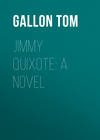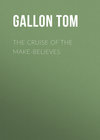Kitabı oku: «Jimmy Quixote: A Novel», sayfa 12
"I only finished five minutes ago," said Jimmy. "I lunch – much later."
"The true meaning of hospitality, my young friend, is to see others enjoy themselves," said Anthony Ditchburn, a little spitefully. "The suggestion is an admirable one; we are but ordinary mortals, and you can at all events have the satisfaction of looking on while we eat. Come, Purdue – lead the way!"
Moira would have stepped forward, in the endeavour to save a catastrophe – would have flung herself into the breach somehow, but it was not necessary. Even then Providence was knocking at the door, though in a strange shape; Jimmy had heard the knocking before the others, and had heard it with dread. He crossed the room swiftly, and opened to the landlady; took from her hand a letter, and, checking what she was about to say, closed the door upon her. He came back to his desk, with a murmured apology as he opened the letter; glanced at Moira with a meaning look.
Inside the envelope, accompanying a brief note, was a slip of pink paper – rather larger than the ordinary cheque, in that it had printed at the top of it the names of many papers unknown in the larger world of literature; it bore two signatures at the foot, and it was for the sum of five guineas. Jimmy thrust it into his pocket, and turned with a bright face to the others.
"It is a great occasion," he said, "and we must celebrate it; we'll certainly go to lunch. But we'll go to my own restaurant; they know me there, and it is more comfortable. Lead the way, Charlie!"
Anthony Ditchburn and Charlie went out of the place hilariously, arm in arm; Jimmy followed with Moira. At the door, as he paused for a moment, she whispered to him, with a look of awe on her face:
"Does it always come in like that, Jimmy?"
He heaved a sigh – laughed a little as he looked into her eyes. "Mostly like that," he replied; and they went down the stairs together.
CHAPTER VI
CHARLIE PLUNGES
Of the qualities that distinguished Charlie Purdue, and that made somewhat for his undoing, it may be safely said that he had got but few of them from his father. Rumour had it that Mrs. Purdue had been a flighty, pretty girl, who had in her time driven the good man almost to distraction, both before and after his successful wooing of her. Daisley Cross had seen but little of her; she had died within a few months of her first coming to the place, leaving a very small boy and a heart-broken husband behind her. So that, in a sense, Charlie Purdue had grown up, as has been shown, in his own fashion – ruled sternly at rare intervals by his father, and for the most part left to his own devices.
If he inherited anything from his mother, it was perhaps that light-hearted gaiety which refused to take the world seriously; that eager restlessness which taught him from the beginning that he had a big inheritance in the world itself, and that he must make the most of it. He was of the kind that could spring from his bed each morning, with the keen anticipation that the new day was to bring him new delights; of the sort, too, that must ever go to bed reluctantly, because the day has closed. To suggest for a moment that Charlie Purdue, launched suddenly into London at the beginnings of a new profession that included men as wild and reckless as himself, should settle down to sober work and to nothing else, was to expect the impossible.
Charlie had told himself (and had told others) that there was time enough for sober work later on; he wasn't going to forget his duties or his responsibilities; but a man could only be young once, and could only face London once in the best of health and spirits, and with the best of friends about him. That old Sobersides, his father, did not know what life meant; besides that, Mr. Purdue's profession debarred him from those delights which were open to his son. Which, perhaps, accounted for the Rev. Temple Purdue's letters to his boy in London.
Those letters were for the most part in response to hurriedly-affectionate letters begging for money. Charlie had begun honestly enough, by pointing out how much money was required in this big world in which he lived, and how quickly the money he had went; there had come mild remonstrances from the father to the son, begging that he would be careful, and would remember that his father, though possessing some private means and a living, was not a wealthy man. Charlie, seeing only the money, had scanned the letters hurriedly, on the chance of news, and had allowed the advice to remain practically unread. Then, when the necessity arose again for money, he had carefully tapped the same source, and with the same result.
But the time came when the father grew suspicious; came to London on the impulse, and sought out his son. He failed to find him at his lodgings, and was, somewhat to his surprise, presented by the landlady with a bill for a sum long due; the good woman thought that such an opportunity should not be lost. The Rev. Temple Purdue, after questioning her carefully, and looking at her with pained eyes of surprise through his glasses, came to the conclusion that it would be well for him to seek his son without delay; he went off at once to the hospital where the boy was supposed to be at work.
Referred from one to the other, and working his way up, as it were, from the students to those in authority, he learned that Charlie Purdue was somewhat irregular in his attendance; they doubted much if he would be there that day. The father took his pained face back to the boy's rooms, and sat down there, with what patience he possessed, to wait for him.
He waited long – waited, with a growing anger in his heart which he strove to control, far into the small hours. Then Charlie came home hilariously with three or four boon companions; saw with dismay the black-coated visitor waiting for him; and understood that unless he exercised great care the game was up. He got rid of the boon companions with some difficulty (one of them persisted in sitting on the stairs for a long time, crooning a love song in a falsetto voice), and faced his father.
Of course, it was the old story; he had really been working very hard – and this was a night of nights, when an old friend had secured an appointment, and the occasion must be celebrated. It had never happened before, and it would never happen again. He was not drunk; the suggestion was absurd, and he was amazed and pained that his father should make it. He was a little excited; the night air had brought a flush to his cheek and an additional light to his eyes. That was all. He trusted he was a gentleman (it was a pity the mantelpiece refused to catch his elbow at the proper moment when he would have leant upon it with dignity), and his father did not understand these things.
His father understood them so well, that that night, before composing himself to sleep upon the sofa in his son's sitting-room, he delivered an ultimatum; and it is probable that Charlie had never seen the kindly old mouth take on so firm a line. Charlie would attend strictly to his studies; instead of having money on every occasion on which he cared to demand it, he would be strictly limited to a definite allowance, and that allowance would not be exceeded.
That had been, of course, practically at the very beginning of things; much had happened since then. For Charlie contrived to keep within the bounds of his allowance for but a week or two; then gaily went back to the old order of things. While his father, watching the post anxiously, was gratified to think that his words had sunk deep into a ready soil, and that the boy was reforming, Charlie was gaily borrowing here, there and everywhere – beginning by little, and making the amounts larger as time went on; giving promissory notes, and playing all the old mad business as thoroughly as it could be played. As for work – well – there were examinations that should some day be scrambled through – at the eleventh hour; for the present they could be set aside, and happily forgotten.
He was pretty deeply involved at the time he came to the house in Locker Street and took the rooms there; it was Charlie's fashion to cast old responsibilities behind him (a sort of wiping of the slate), and to take on new ones cheerfully. Here, for the first time, in the quiet room with the two women wherein he sat at night, he determined that he would work; books were fetched out, and Charlie plunged into this matter of medicine again as heartily as he had once begun it. The mere fact that Moira sat near him, and was proud of him, was a stimulus; she should see that he was no mere idler.
But after a time the old life called to him again, and with no uncertain voice. He was not interested in the least in the profession he had adopted; only the irresponsibility of it – the jolly companionship of other students – appealed to him. It was the life he liked and wanted; never the work.
He began in a foolish fashion to cheat his father a little. Pressed for money, he wrote that new books must be bought, and fresh fees paid for lectures; he was careful to specify the books and the lectures. The Rev. Temple Purdue, pleased to think that he had won so easy a victory, sent the money at once; Charlie, a little ashamed, was yet pleased to think that he had tapped that source of wealth again. He did not buy the books nor pay the fees; the money went elsewhere. A little later on, when necessary, he would be able to borrow the books or to buy them secondhand; and his father could be put off with another excuse.
But that father remembered always that he had this one son; he kept a more watchful eye upon that son's future than the boy imagined. Examination lists came out, and failed to tell the tale the father expected; inquiries were set on foot, and the miserable story leaked out bit by bit. Charlie was summoned by a telegram to Daisley Cross; and went down there, inventing stories on the way – stories that grew more desperate with each mile that the train covered.
The old place seemed to have dwindled a little in the years; Charlie, reaching it in the evening, felt that he understood, resentfully and yet pityingly enough, that a man who had lived so many years in its narrowness, and in the midst of its petty happenings, must necessarily fail to understand that broader life and that bigger world in which he himself had flung away his substance. Above all things, his father was not a man in whom there was any real live blood; he was a creature (or so Charlie felt) in whom passions and hopes and ambitions had died long since, giving place to the mere desire to live comfortably and at peace with his neighbours. How could he understand the game of life as Charlie had played it?
The rectory looked grim and forbidding when he got to it; some memory of days when, as a boy, he had crept back half exultantly and half in fear from some escapade came full upon him; this seemed to be just such another home-coming. He would not go in yet; he would wait, and rehearse again what he meant to say, and rehearse it better. He went on past the rectory – past the old house where Paul Nannock had lived so long ago, as it seemed – and so to the little churchyard adjoining the church. There were lights in the windows of the church, and the sound of the wheezy old organ, and of voices accompanying it, floated out into the darkness. Charlie leaned against the wall of the churchyard and waited; now making up his mind to go and face his father boldly; now determining to remain where he was, until he had his lesson more complete in his mind.
While he debated, the organ gasped and wheezed and was still; a door at the side of the church was opened, and some dim figures came out, snuggling their necks into the collars of overcoats and jackets. Almost the last of them was a bent figure that exchanged salutations with them, and then, turning, came on towards where Charlie was waiting. He knew the figure before it reached him for that of his father.
The Rev. Temple Purdue stopped within a yard or so of him, and scanned him closely for a moment; then held out his hand. In that first gesture there was a natural warmth, as from the father to the son; a moment later he had checked it, and it was the grave salutation of the man with a painful duty to perform. Charlie stiffened at the altered touch, and hardened himself to meet what was to come.
"I thought I'd better come up and see you," said Charlie, standing stiff and aggressive, and towering by many inches above the little rector. "I suppose I'm in for a wigging – eh?"
"Charlie! – Charlie! – have you nothing else to say to me than that?"
"What am I to say?" retorted the other. "I suppose you'd call me a lost sheep, and goodness knows what else; and I suppose it'd be all true. We look at things from opposite points of view – you and I."
"You've had chances enough," said his father, moving on towards the gate of the churchyard, and glancing round at the tall fellow who lounged beside him. "It's been a series of failures from beginning to end – "
"I never liked the work," said Charlie, slashing at the grass with his stick as he walked. "All very interesting to begin with – but a year or so of it would sicken anyone. Besides, there are easier ways of getting through the world and making a living. Look at our old friend Jimmy – Jimmy Larrance."
"What of him?" The rector spoke sharply, for, according to his information, this was but another erring young man, who had refused to take advantage of the benefits that had been showered upon him. "What has he done?"
"Why, without any training, or anything of that sort, he's taken to writing for the papers – and makes rather a good thing of it. That's what I ought to have done," added Charlie seriously; "I wanted something that I could sit down to when I felt in the mood, or – or not sit down to when I didn't feel in the mood. That's the sort of thing I was cut out for; it's the sticking to it, whether I like it or not, that upsets me."
In that walk back to the house, where the old man lived practically alone, the rector endeavoured to impress upon Charlie, with the use of many platitudes, the necessity for that sticking to it; but without much effect. For Charlie knew the real state of the case, and his father did not; Charlie understood only too well the huge pile of debts that hung like a cloud over certain parts, at least, of that gay London the boy loved. Only a very small fraction of these had been confessed to; and even that fraction had been sufficient to disconcert Mr. Purdue. Charlie had, in a sense, burnt his boats; he could not make that fair and fresh beginning his father suggested, and he knew that there was no one to whom he could appeal to help him out of the tangle into which he had got. The most he could hope for was some temporary assistance, to be given him until such time as, by some extraordinary freak of Fortune, a few of his creditors should die or disappear, or some benevolent, but hitherto unsuspected, relative should leave him a large sum of money.
The talk lasted well into the night; Charlie, lounging in a chair, seeing the end of his hopes looming nearer with every moment, and his father pacing up and down his study with short, nervous steps, and explaining his view of the situation. Gradually, in the sheer hopelessness of the business, Charlie blurted out some further confession of the position in which he found himself; was forced in cross-examination to disclose yet a little more; and so stood, with nearly everything laid bare before the old man, and himself grinning – half recklessly, half with relief – at the thought that the worst was told.
That was, of course, the end of all things. Mr. Purdue had a duty to perform, and he had already been sorely tried. Charlie refused to go on with his profession; refused, for the time at least, to entertain the thought of any other. His father left him at last to his own reflections, telling him that he would try and sleep, and try better alone to understand the situation, and how best to grapple with it.
The dawn was coming in through the cracks in the shutters, and the lamp was burning low, when the father came downstairs – hollow-eyed and unkempt – to confront his son. In his own simple fashion the good man had spent the night in some sort of halting prayer to the God who had given the boy to him; he felt he had arrived, with that help, at a solution. Charlie, watching him furtively, wondered what was coming.
"Since you will do nothing I suggest – and since you have wasted every opportunity that has ever been given to you – I have determined to leave you to your own devices. I am going to give you a draft for fifty pounds; that is the last you will ever have from me. If you are sincere in meaning to make a start in some new mode of life – that will give you the start; but I can do nothing more. Your life is in your own hands, and you must make what you will of it. Good-bye!"
Charlie suppressed his feelings; there was a sort of wonder in his mind that he should have come out of the thing so well. Fifty pounds meant everything just then; it would keep him for – well, never mind exactly how long; that was not a time to juggle with dates. The proper thing to do, of course, was to show penitence and a chastened spirit; and Charlie contrived to convey both pretty admirably. He took the draft; listened to a few last words from the father who was breaking his poor old heart in the dawn of that morning for him; and went back to London.
Went back – to begin his new life in a special and an easy sense. He sold his medical books at once, and said good-bye to all the work of the years he had spent in London; then looked about him (with the feeling that there was no special need for haste in the matter), to decide what he should do in the future. His experience seemed to have taught him that there were one or two remarkably easy professions – such as painting and literature, and slight matters of that kind – where no preparation was specially necessary, and where the life and the surroundings were attractive. Almost his mind leaned towards painting; he had heard that your art student was a happy-go-lucky bohemian, in a picturesque costume, who smoked innumerable pipes, and sang while he worked. Charlie felt he could manage that role pretty well.
Having ample time upon his hands, he even invested in an easel and a paint-box and a few canvases; was a little astonished, when he came to the actual work, to discover that lines would not go quite where they were intended, and that some small knowledge was necessary even for the mixing of colours. However, that difficulty could surely be got over; Charlie joined an art school, where, in less than a week, he was the most popular student, and had already given two delightful dinners at a restaurant in Soho. He felt that here, at last, was the very profession for which he had been looking.
But he tired of that, as he tired of everything else; and a chance visit to Jimmy, and the sight of Jimmy driving a pen furiously, while a printer's boy dangled his legs and strove not to whistle between his teeth, spurred Charlie to the knowledge that perhaps after all he had made another mistake, and that there was no reason why printers' boys should not wait on him. He went home, to fling easel and canvas and brushes aside, and to look for a pen that absolutely suited his hand.
He wrote something, and took it down to practical Jimmy; and practical Jimmy scanned it thoughtfully, and made suggestions – something on the lines of those given to himself some years back, by the young man in a certain office of a certain paper – the first for which Jimmy had worked. Charlie was deeply grateful, and took the thing away; looked at it on reaching home, and decided that Jimmy was altogether wrong about it; and pitched it into a corner after the easel and the canvases.
Yet he tried again – and yet again; flinging into each effort a fierce energy that carried him on feverishly for an hour or so; and then dropping the work, and never going back to it with any energy at all. Now and then he railed against his ill-luck; more often he laughed, and said it didn't matter. And slowly saw the fifty pounds dwindling, and told himself – or tried to tell himself – that that didn't matter. If only he had had the chance that Jimmy had had; if only he had had to fight his way as Jimmy had done; if only it had happened that he had not possessed a dear good father (much too good for him, he added sometimes in generous moments); he might really have done something. People had been a jolly sight too good to him – all the dear people he had met in the world had made the mistake of not treating him seriously. However, if once he did see the sort of work that would suit his temperament – well, he would astonish some people; and then they'd be sorry for some of the things they had said!
Weak himself, he carried with him a very pestilence of weakness; painted the world in grey and feeble colours for other people. Moira, seeing him apparently striving against dreadful odds, pitied him, and called the world hard for his sake; those who succeeded had been but lucky, she thought, and good-natured, laughing Charlie had been bruised by the world, and had not deserved his bruises. In a sense, setting the one man against the other, she wavered a little in her favour of Charlie; seemed to see in him one of those failures that yet are half-successes, because the failure is taken with a shrug, good-humouredly, and because he who fails is not strong enough to fight against it. Jimmy was all right; Jimmy had seemed to succeed from the very first, and his moments of poverty had been mere light accidents, to be set aside and forgotten. She knew but little of Jimmy's fight; she had only touched his life, as it were, when first that life blossomed, however humbly, into print.
The starved heart of the girl longed and hoped always for love; hoped unconsciously, just as it had done in the old days, when she had struggled so fiercely to be first with Old Paul. Above all, it has to be remembered that Charlie had come into her life – full of gaiety and light-heartedness – at a moment when that life was dull and grey and commonplace; and he bore upon him always, either in failure or success, the stamp of youth, and hope and cheeriness. On the darkest mornings, when the streets outside were hideous, and the young spirit of the girl was fighting fiercely against the restraint of those few sombre rooms, it was Charlie who could always come up the stairs two at a time; Charlie who could burst into the room with a laugh and a joke; Charlie who could drag her out into the streets for a walk; Charlie whose cheery tongue was never still. It was what she needed; it was more than food and drink to her then.
Jimmy, in a sense, stood aloof; Jimmy was on quite another plane. Once or twice, when she had mustered courage to go round to his rooms, he had been either very busy or else not there at all; she had had the long tramp back to Locker Street, Chelsea, with the thought uppermost in her mind that Jimmy was slipping away from her. She had hoped so much at the first; she was to draw Jimmy into that magic circle again; to open up afresh the half-worked gold mines of their childhood. But Jimmy was in a sense inaccessible.
To be put to the account of Charlie Purdue was his poverty, and the disaster that had fallen upon him. Moira made no count of right or wrong in such a matter as this; her friend was in trouble, and that was sufficient. Charlie had only to point to all he had endeavoured to do – his medical knowledge, in the right use of which he had failed (or so he told her) on a mere technical quibble of the examiners; his easel and brushes, in the use of which again he had failed because he had not had a fair start; his manuscripts – in which he had not been so lucky as a certain Jimmy Larrance. Only give him an opportunity, he asserted passionately again and again, and he'd soon show them.
But the opportunity did not come, and the money steadily dwindled. Charlie became for the first time in his life a little careless in regard to his dress, and a little shabby; took to sitting in his room the greater part of the day, staring into the fire, and smoking much. Moira would creep down to see him; opening the door a little way, and looking in, and calling to him softly; on which he would look round, and make a valiant effort to call up something resembling the old genial smile; and tell her with a nod that "it was all right; he was thinking about things." And she would go away heavy-hearted.
She went down one night, to find him sitting in the light of the fire, with his chin cocked in his hands; he did not look round as she entered. She crossed the room softly, and stood near him; put out a hand nervously, and touched him on the shoulder. He looked round at her with a whimsical smile; then stared again into the flames.
"Charlie – Charlie!" she whispered. "What are you going to do?"
"The Lord He knows best – and I don't!" said Charlie, without looking up at her. "I've thought of everything; I don't seem to have any energy left – or any hope. It doesn't seem fair somehow that I should fight like this – or try to fight – with no result."
"You've tried a great many things," assented Moira.
"Haven't I?" He looked round at her gratefully. "That's where it is; my worst enemy can't say I haven't tried. I'm a fellow of energy really; no sooner does an idea enter my head than I'm off after it like a shot. It's a matter of luck, my dear. I haven't got the luck. A fellow like Jimmy simply drops into the thing at once."
"Jimmy works very hard," suggested Moira.
"And I don't, I suppose?" he broke in quickly. "Oh, you may as well say it; I don't mind. Yet if Jimmy had failed, the boot might have been on the other leg. I thought you believed in me a little," he added bitterly.
"Of course I do," she said quietly. "I only wish I could help you."
"Why, so you do," he replied, with a sudden change of tone. "You put heart into me, many and many a time; you've been a sort of good angel to me." He got up suddenly, and dropped his hands on her shoulders, and looked into her eyes. "If I'd known you earlier, Moira, I might have done big things; I wanted guiding."
It was, of course, the cry of the coward – the despairing cry of the man who, having failed, shifts the blame on Fate, and cries out what might have been, had everything been different! But of course she did not know that; her young heart warmed to him at that blessed thought that she might have helped him – that she might even help him now. She was lonely – as he was; her life seemed to have gone down into the shadows – as his had done. She looked at him with shining eyes.
"Oh, it isn't too late, Charlie; you're young, and you can fight the world easily enough. All your energy will come back. You must fight."
"Not alone, dear." He said it then, as he said most things, on the impulse of the moment; perhaps because her eyes were shining as they looked into his; perhaps because her mouth was soft and tender as it pleaded with him. He dropped the hands upon her shoulders to her elbows, and drew her towards him. "Not alone, Moira; I haven't the strength."
"But how could I help you?" she whispered.
"As only a woman can help a man," he went on more eagerly, pleased with the sudden idea that had come to him, and almost feeling that it had been in his mind for a long time. "I love you, Moira; with you beside me I can fight such a battle as never man fought yet. You shall help me; we'll fight together."
"But, Charlie" – her hands were on his breast, and she was holding him away for a moment – "we are so poor, both of us – so young. After all, although I want to help you – why should I add to your burden? How should we live?"
"Oh, the old parrot cry of living!" he exclaimed, getting his arms about her, and drawing her towards him. "Look here, my dear; the world has behaved pretty roughly to both of us; to me most of all. I've been a bit wild, I know; but no one has properly understood me yet. I can do big things; I can do anything; but I want steadying. Besides – I've always loved you, you know; didn't I hunt for you in London, directly I knew you were here? Say you love me, dear."
"Of course – of course I love you, Charlie," she faltered. "At least, I think – "
"Oh, never mind what you think," he exclaimed impetuously. "The words are enough – you've said you love me. Kiss me; I'll be awfully good to you – and you'll find you've made a new man of me. Don't look so frightened; I've been meaning to say this to you for a long time."
Her lips met his, but with no ardour in the touch; she seemed to be thinking. He kissed her again, and strove to look into her eyes; and asked a little roughly what was the matter. She looked up into his face; perhaps she strove to read there some fulfilment of the dreams that had been hers during these past few years; perhaps she remembered, in that hour, certain words of Old Paul's – spoken a long, long time ago; they seemed to rise like an echo in her heart now. "What will love do to you in the big world, Moira?"
"There is nothing the matter, Charlie; I – I was only trying to think how happy I ought to be," she whispered, with a faint laugh. "Because I thought once – dreamed it, I think – that when love came to me it would be something like the angels one thinks about in childhood – something great and marvellous."
"And isn't it?" he asked, quite simply.
"I don't know – yet," she replied, disengaging herself from his arms. "Perhaps it's because I haven't had time to think about it."
"I didn't need to think about it," he exclaimed. "I knew in a moment."
"Yes – but then you're different," she replied. "Let me go now; we'll talk about this – some other time."
"But you've said you loved me," he cried, striving to detain her.
"I – I think so," she breathed. "Oh – won't you let me get a little used to it?" she asked whimsically, and ran out of the room.










